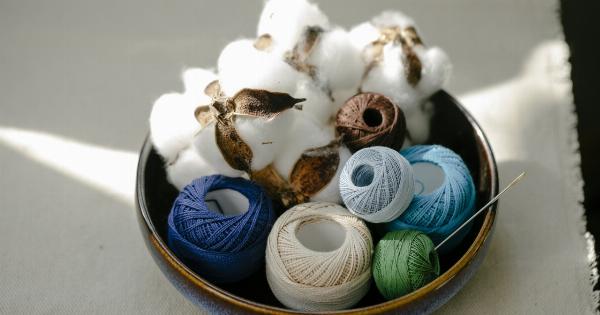When it comes to maintaining healthy and radiant skin, incorporating natural and effective products into your skincare routine is key. One such product that has gained popularity in recent years is clay.
Clay has been used for centuries for its various healing and purifying properties, making it a game-changer for skin health. Whether you have oily, dry, or sensitive skin, clay can work wonders in improving your overall complexion. In this article, we will explore the incredible benefits of clay for skin health and how it can revolutionize your skincare routine.
The different types of clay and their specific properties
Clay comes in many different forms, each with its own unique set of properties and benefits for the skin. Here are some of the most popular types of clay and what they can do for your skin:.
1. Bentonite Clay
Bentonite clay is known for its detoxifying and purifying properties. It has the ability to absorb excess oil, unclog pores, and remove impurities from the skin. This makes it an excellent choice for those with oily or acne-prone skin.
Bentonite clay also has a soothing effect on the skin, making it suitable for sensitive skin types.
2. Kaolin Clay
Kaolin clay is a gentle and mild clay that is suitable for all skin types. It helps to cleanse and exfoliate the skin, removing dead skin cells and impurities.
Kaolin clay is also known for its ability to improve blood circulation, leaving your skin looking fresh and vibrant.
3. French Green Clay
French green clay is rich in minerals and has excellent absorption properties. It is particularly effective in drawing out toxins and impurities from the skin, making it perfect for deep cleansing.
French green clay also helps to tighten pores and improve the overall texture of the skin.
4. Rhassoul Clay
Rhassoul clay is a Moroccan clay that has been used for centuries for its beauty-enhancing properties. It is high in minerals like silica, magnesium, and calcium, which help to nourish and revitalize the skin.
Rhassoul clay also has excellent absorption properties, making it effective in absorbing excess oil and impurities.
5. Rose Clay
Rose clay is a gentle and mild clay that is suitable for sensitive skin types. It has a soothing effect on the skin and helps to reduce redness and inflammation. Rose clay also helps to cleanse and exfoliate the skin, leaving it soft and smooth.
The rejuvenating effects of clay masks
One of the most popular ways to incorporate clay into your skincare routine is through the use of clay masks. Clay masks offer a range of rejuvenating effects for the skin, depending on the type of clay used.
Clay masks help to draw out impurities, toxins, and excess oil from the skin. They unclog pores and remove dead skin cells, leaving the skin looking fresh and radiant.
Clay masks also help to improve blood circulation, which can give your complexion a healthy glow.
In addition to their cleansing and exfoliating properties, clay masks can also nourish and hydrate the skin. They contain minerals and nutrients that are beneficial for skin health, helping to improve the overall texture and appearance of the skin.
When using a clay mask, it’s important to choose the right type of clay for your skin’s needs. If you have oily or acne-prone skin, opt for bentonite clay or French green clay.
For dry or sensitive skin, kaolin clay or rose clay may be more suitable. Apply the mask to clean skin, avoiding the eye area, and leave it on for the recommended duration before rinsing off with warm water.
The detoxifying power of clay baths
While clay masks are more commonly used for the face, clay baths offer a unique and luxurious experience for the entire body. Clay baths have been used for centuries for their detoxifying and therapeutic effects.
Clay baths help to draw out toxins and impurities from the body, promoting overall detoxification. They can aid in the removal of heavy metals, environmental pollutants, and other toxins that may accumulate in the body over time.
Clay baths also help to balance the skin’s pH levels and soothe skin conditions such as eczema, psoriasis, and dermatitis.
To enjoy a clay bath, simply add a few scoops of clay powder to your bathwater and soak for at least 20 minutes. The clay will mix with the water, creating a luxurious and detoxifying experience for both your skin and body.
The exfoliating properties of clay scrubs
In addition to clay masks and baths, clay scrubs are another way to incorporate this game-changing ingredient into your skincare routine. Clay scrubs offer gentle yet effective exfoliation, removing dead skin cells and unclogging pores.
Clay scrubs help to smoothen and brighten the skin, leaving it soft and supple. They promote cell renewal and improve the skin’s texture, making it look more youthful and vibrant.
Clay scrubs also help to improve the absorption of other skincare products, allowing them to penetrate deeper into the skin.
To use a clay scrub, dampen your skin and apply the scrub in gentle circular motions. Massage the clay scrub onto your face or body, focusing on areas that may need extra exfoliation.
Rinse off with warm water, and follow it up with a moisturizer to lock in hydration.
Unlock the game-changing potential of clay
With its numerous benefits and therapeutic properties, clay has emerged as a game-changer in the world of skincare. Whether you choose to incorporate it through masks, baths, or scrubs, clay can help to transform your skin health.
However, it’s important to keep in mind that everyone’s skin is different, so it’s essential to select the right type of clay for your specific needs.
Consider consulting with a skincare professional or conducting a patch test before incorporating new products into your routine.
So, why wait? Discover the incredible benefits of clay for your skin today and unlock the secrets to radiant and healthy skin.






























